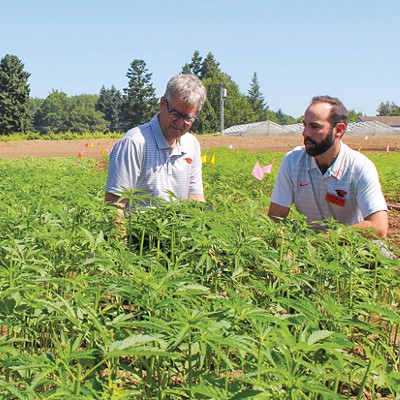In light of recent proposed changes to cannabis policy in Deschutes County, the Source sat down with Sheriff Shane Nelson to talk pot.
Source Weekly: Have you ever smoked marijuana?
Shane Nelson: I do not discuss personal questions. I was opposed to Measure 91—recreational marijuana legalization—and educated citizens on my view.
SW: Do you object to the growing of marijuana in the county, or all marijuana-related activities, such as dispensaries, labs, processors and medical use?
SN: Marijuana is against federal law. I respect the voice of the voters, but it is a bad position for law enforcement when state law directly conflicts with federal law. I do not want any more marijuana grows in the county. I have heard from several rural residents who do not want to live next door to marijuana grow operations and have reported negative livability issues over marijuana smell, increased traffic to the area, water use and failure to follow county code. In addition, Oregon has an overproduction of marijuana in a system that claims to be regulated but only has 23 OLCC inspectors for nearly 1,200 grows. It is supply versus demand. Former Oregon State University Professor Seth Crawford told the Associated Press that, "Oregon produces three times more marijuana that it can consume through its legal market." A draft Oregon State Police Marijuana Analyst report advised $4 billion to $9 billion worth of street value marijuana is being sold on the black market. [It's time] for Oregon to pause on marijuana production.
SW: There are 145 applications for producers, labs, retailers and wholesalers waiting to be processed by the Oregon Liquor Control Commission, which has stated they're trying to streamline the process. What's your stance on the pending applications?
SN: Oregon needs to pause on marijuana productions and get more enforcement in place before reviewing these applications—do not approve anymore. They need to stay consistent on their process, streamlining leads to inconsistencies and that creates problems. This needs to be set up more how they have their liquor store applications set up. Even though they do not have a "cap," there are only a certain number of liquor stores that appear to get approved in any given area. The ratio of marijuana stores is far higher than that of liquor stores. Again, consistency.
SW: Last year the state gave out $85 million in marijuana taxes for schools, public health, police and local governments. Our state school systems have been underfunded for decades. Do you feel the opinions of a minority of residents outweigh the tax benefits for the county?
SN: Minority of residents? Where is this information coming from? Deschutes County passed recreational marijuana legalization by a slim 51 percent to 49 percent margin. Rural residents' vote counts defeated the measure by approximately 55 percent to 45 percent. I have heard over and over again people voted to legalize marijuana use—even some who have no interest in using it—they did not vote to have a marijuana producer next door to where they live.
SW: Would you say you're devoting a lot more time to marijuana-related crimes and issues these days?
SN: We are, especially as marijuana grow activity increases in the county. Citizens who are concerned about livability issues are calling us to check on these grows. They are concerned about their property values—one property on the market for $675,000 in the Redmond area had two offers fall through because of a proposed marijuana grow application on Highway 126 which the commissioners rightfully declined to approve. Real estate agents have shared their concerns over property values declining from marijuana grow operations out in some of the scenic acreage areas of the county.
SW: You've said many people have called your office against growing operations. Could you give an estimate of the number? How much staff time is that taking up?
SN: Approximately about 50. I mentioned this [on your other question]. We are seeing this increase as applications for grow operations increase.
SW: Are you dealing with other issues related to usage? If so, what are they?
SN: We have seen an increase in marijuana DUIIs. [35 drug DUIIs in 2017, 17 of which were marijuana-related and 31 drug DUIIs in 2016—13 were marijuana related. Sgt. William Bailey provided the Source these numbers.] *These numbers do not include cases where the DUII was alcohol related, but the driver also had marijuana in their system.
SW: If the federal government changes marijuana from a Schedule 1 drug, or legalizes it outright, would your opinion about marijuana use in the county change?
SN: Marijuana is a dangerous drug, especially with the higher THC content of marijuana now. It should not be rescheduled. Oregon Poison Control presented a 4-year-old child overdosed on high THC concentrate. [The] child's body was paralyzed and stopped breathing, is how it was explained to me. I have heard of a murder case where the suspect is trying to use marijuana use as an altering substance that led to the act of murder.
Having said that, that would be the right way to do it. Legalize it at the federal level—although I would be against that and make my voice heard—then state law would not be in direct conflict with federal law. I would change my stance, but still have concerns over how issues would affect public health, public safety and livability of our community. Those concerns exist over alcohol use [as well].
SW: Are you aware of any other county sheriffs who hold your same opinion on marijuana?
SN: Yes. Contact John Bishop at Oregon State Sheriff's Association, Sheriff Matt English, Hood River County and Oregon State Sheriff's Association President.
SW: At a Bend Chamber "What's Brewing" event, you and DA John Hummel talked about your stance on immigrations, and noted, if we recall correctly, that it's your job to uphold local laws. Is that also your stance on other issues, including local marijuana laws?
SN: Yes. I enforce local laws. The citizens I work for entrust me to ensure we have a livable community through excellent public safety. They expect me to speak up on these issues that affect public safety. I do not want additional marijuana grows in the county. It affects our rural residents and we have enough marijuana for the legalized market in the state.
SW: Have you seen positive budgetary changes as a result? In other words, how has your budget increase jived with a possible need for more marijuana-related enforcement?
SN: No. Deschutes County only received approximately $300,000 worth of marijuana money. Our office is going to ask the county commission to approve an FTE (full time employee) for the sole purpose of being proactive in marijuana enforcement. We have another FTE who works with CDD in county code enforcement and it is my projection that deputy will be working a lot on marijuana issues as well. That is approximately 200K in employees. Our office recently checked on six reported marijuana grows that were called in by citizens We have seen an increase in marijuana-related DUIIs. This 300K will not all go to the Sheriff's Office. The tax money is talked about quite a bit. What will the future cost be? Medical costs from [the] Butane Honey Oil lab injuries are expensive and we have had homes burn down as a result. What is the cost of insurance? And those uninsured who need medical attention? What will the cost be for education of our youth to avoid the pitfalls associated with recreational marijuana use? I do not see a lot of investment in education against its use outside of the work done by the nonprofit Clear Alliance. The genetically engineered marijuana today has much higher THC contents than the marijuana when I started in this business.
There have been studies linking marijuana use to mental illness. The National Institute on Drug Abuse states, "60 percent of high school seniors don't see regular marijuana use as harmful—nearly double from 20 years ago. Twelfth graders' use has increased from 26 percent to 36.4 percent in this same period. The active ingredient in marijuana has been genetically strengthened five times over what it was 20 years ago." I have spoken to addicts on the street and in the jail who share that their addiction started with alcohol and marijuana. Where is the education piece from the state of Oregon? This is basic supply versus demand. If marijuana is more accessible to our youth then it is probable to expect use will increase.
We saw youth marijuana usage increase with the legalization of medical marijuana. Medical marijuana did not produce the same big business type of interest or the size of marijuana grows that the recreational legalization is. Marijuana can have detrimental effects on the developing brain, just like alcohol. When measure 91 passed, I respected the voice of the voters and adjusted my focus on preconceived notions or judgements or solely on personal preference—I listen to the citizens I work for and represent them based on my training and experience, philosophy and their input. Several rural residents—and some within incorporated areas of our county—do not want any more marijuana grows.





















